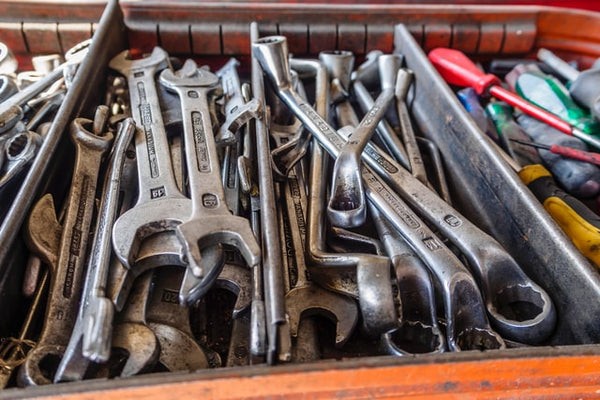Maintaining or repairing your car can seem daunting, but with the right tools and some knowledge, you can tackle many common issues yourself. Having a well-stocked toolkit not only empowers you to perform routine maintenance but also prepares you for roadside emergencies. This guide will outline the essential tools you need to fix a car, from basic hand tools to more specialized equipment.
Essential Hand Tools: The Foundation of Your Toolkit
These fundamental tools are the building blocks for any car repair project:
Sockets and Wrenches: Tackling Nuts and Bolts
- Socket Set: A comprehensive socket set, including both SAE (standard) and metric sizes, along with various drive sizes (1/4″, 3/8″, 1/2″), is crucial for removing and tightening nuts and bolts. Deep sockets are essential for reaching fasteners recessed in tight spaces.
- Combination Wrench Set: While sockets handle many situations, a combination wrench set provides the flexibility needed for tight spots where a socket won’t fit. Each wrench combines an open end and a box end for versatility.
- Breaker Bar: For extremely stubborn or over-torqued fasteners, a breaker bar provides the necessary leverage to loosen them without damaging your ratchet or wrench.
Pliers and Wire Cutters: Essential for Electrical Work and More
- Plier Set: A variety of pliers, including slip-joint, needle-nose, and diagonal cutting pliers, are indispensable for gripping, bending, and cutting wires, as well as handling small parts.
- Wire Strippers: Essential for removing insulation from electrical wires for repairs and installations.
Screwdrivers: Versatile Tools for Fasteners
- Screwdriver Set: A set with various sizes and types of screwdrivers (Phillips, flathead, Torx) is a must-have for any car repair. Ratcheting screwdrivers can speed up the process.
Beyond the Basics: Expanding Your Automotive Arsenal
Diagnostic Tools: Understanding Your Car’s Issues
- OBD-II Scanner: An On-Board Diagnostics (OBD-II) scanner plugs into your car’s diagnostic port and reads trouble codes, providing valuable insights into the cause of malfunctions. Many affordable options connect to your smartphone.
Emergency and Maintenance Essentials
- Tire Pressure Gauge: Maintaining proper tire pressure is vital for safety, fuel efficiency, and tire longevity.
- Jumper Cables: Essential for jump-starting a car with a dead battery. Choose a set with heavy-gauge cables and strong clamps.
- Duct Tape: A versatile tool for temporary repairs, securing loose components, and even patching small holes.
- Zip Ties: Great for organizing wires and cables during repairs.
- Lubricants and Penetrating Oil: Penetrating oil helps loosen rusted or seized fasteners, while lubricants keep moving parts working smoothly.
- Latex Gloves: Protect your hands from grease, grime, and chemicals.
Conclusion: Empowering Yourself with the Right Tools
With the right tools, you can confidently tackle many common car repairs and maintenance tasks, saving money and gaining a deeper understanding of your vehicle. Start with the basics and gradually expand your toolkit as your skills and needs grow. Remember to prioritize safety and consult reputable resources for guidance when undertaking more complex repairs.


